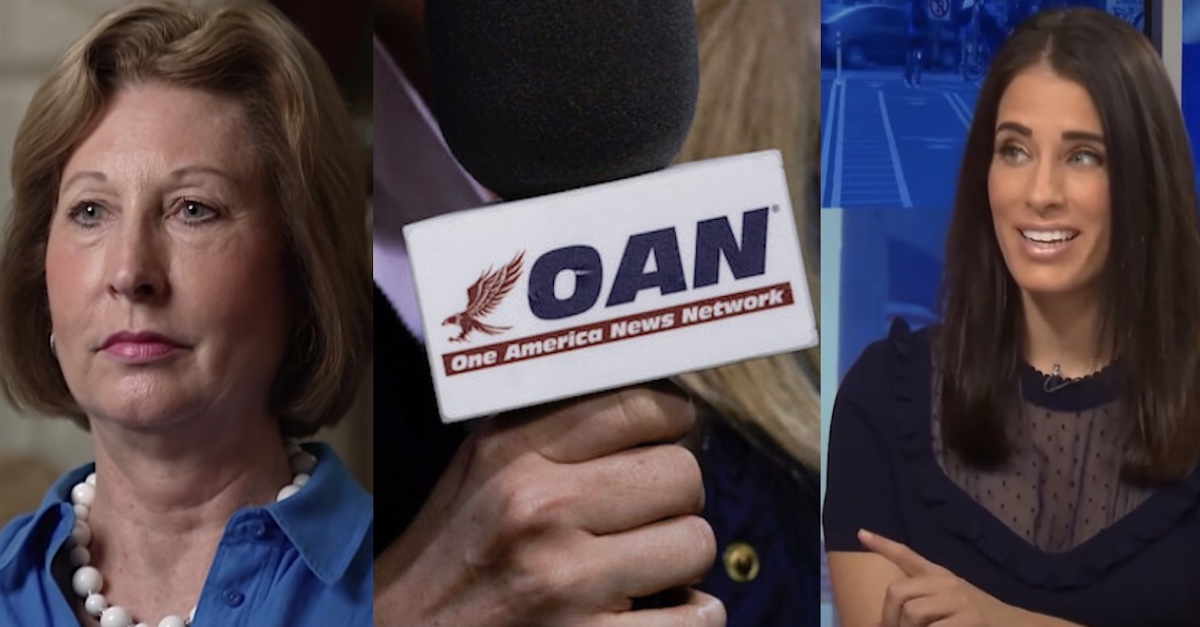
Sidney Powell appears in an August 2021 interview with the Australian Broadcasting Corporation (Australian Broadcasting Corporation/YouTube screengrab), OAN reporter with a microphone (Drew Angerer/Getty Images), Christina Bobb during an OAN appearance (YouTube/screengrab)
First it was “document dumps,” and now it’s remote depositions.
The billion-dollar 2020 election-related defamation lawsuit brought by Dominion Voting Systems against Sidney Powell, OAN and its current and former personalities, Rudy Giuliani, MyPillow, and former Overstock CEO Patrick Byrne, has devolved into fighting over just how to conduct depositions of numerous plaintiff and defendant witnesses.
While Dominion asserts that the “most just, efficient, cost-effective, and safe” way to go about the “more than one hundred” Q&A sessions would be remote depositions, with the possibility of “in-person depositions upon agreement or when demonstrable good cause exists,” Powell, OAN (Herring Networks, Inc.), Donald Trump lawyer Christina Bobb, and Byrne, have expressed full-throated opposition to the proposed protocol that depositions of witnesses be conducted remotely as a default rule.
On Wednesday, Dominion interpreted the defendants’ collective opposition to remote depositions as “based largely on outdated or inapposite caselaw” and as geared towards “impos[ing] outsize burdens on Dominion alone while virtually ensuring disorder and delay.”
The voting machine company, suing over oft-repeated but never-proven claims that it stole the 2020 election from former President Trump and handed it to President Joe Biden, said it was “telling” that the defendants want to question Dominion’s witnesses in person while “apparently hav[ing] no complaints” about Dominion grilling defendants’ witnesses remotely:
On this point, it is worth noting that Dominion, which has the burden of proof on the element for which witness credibility will be most at issue—actual malice—presently intends to proceed with remote deposition for many of Defendants’ witnesses. Defendants’ approach to the remote depositions of their own witnesses is telling here. Though Defendants strenuously object to remote deposition of Dominion’s witnesses, they apparently have no complaints about Dominion’s stated intention to conduct depositions of Defendants’ witnesses remotely. Across four different motions, not one Defendant even mentions it.
Noting that remote depositions have been conducted all over the U.S. “without incident” in the aftermath of the COVID-19 pandemic, Dominion also rejected the “completely overstated” and “speculative” concern that defendants “could be prejudiced if Dominion or its attorneys commit misconduct during a remote deposition.”
“And although it hardly bears writing, Dominion of course intends to conduct all depositions according to the ethical standards that apply under the Federal Rules and to litigants and attorneys more generally,” the filing said.
Dominion told U.S. District Judge Carl Nichols, a Trump appointee, that if the defendants’ proposal is accepted, then Dominion will have to shoulder the costs of flying its attorneys and witnesses “all over the country” while “Defendants will be at their leisure to attend in person or virtually.”
The plaintiff asked Nichols to, “at the very least, order that in-person depositions will take place at a location of the witness’s choosing” if the judge does not agree with the remote depositions-by-default proposed rule.
Sidney Powell
Powell’s opposition to Dominion’s proposal said that the “Kraken” attorney is asking for “nothing more than to have the means of depositions be governed” by the Federal Rules of Civil Procedure.
“Armed with only speculation and hyperbole, mixed with a few subtle attacks, Dominion has requested an unprecedented blanket order for remote depositions by default. Its reasoning does not demonstrate a legitimate need for such an extraordinary request,” the opposition said. “Further, the request would prejudice Powell, who must defend against the claims brought against her.”
Powell, through her attorney Joshua A. Mooney, said that Dominion “would light a match to the Federal Rules of Civil Procedure to weaponize the rules of discovery for its own ends in disregard of federal practice standards,” if the plaintiff got its way.
The defendant rejected Dominion’s concerns about “travel costs” by calling those concerns, in a word, “rich.”
“[Dominion’s concern] ignores that Dominion solely and wholly decided to file five separate lawsuits before this Court seeking over a billion dollars in damages against defendants, most of whom are individuals,” the filing said. “To then complain about costs of travel to prove its claims is rich.”
The opposition also accused Dominion of invalidly and shamelessly “exploit[ing] the COVID-19 Pandemic and the extraordinary public health measures taken by governmental entities during 2020-21 to serve its own ends”:
The Pandemic was declared over long ago. Vaccines for the flu and COVID-19 are readily available, and Dominion’s own attorneys have not worn masks in appearances before this Court or the Delaware Superior Court. Nor is Dominion waving its right to depose Ms. Powell in-person, and this Court can bet its bottom dollar that Dominion has every intention and expectation to depose Ms. Powell in person, COVID-19 and flu concerns notwithstanding. Dominion never raised this “concern” during calls with Defendants, which should speak to its ad hoc kitchen sink nature.
OAN, Chanel Rion, Herring Networks, Inc.
The OAN defendants cut right to the chase by arguing that in-person depositions should be the norm in a “multi-billion dollar lawsuit that threatens One America News Network’s very existence.”
“In a case with such high stakes, it is imperative that the Herring Parties be afforded the benefits associated with in-person depositions […],” OAN’s opposition said. “Should a deponent’s unique circumstances counsel in favor of holding a remote deposition, Dominion will be entitled to seek such relief on a case-by-case basis, as is standard practice in federal litigation. That, however, should be the rare exception—not the default rule that Dominion seeks here.”
OAN asserted that Dominion has not shown “good cause” for a remote deposition default rule and, like Powell, rejected concerns about “COVID-19 and other communicable illnesses” factoring in.
“First, the COVID-19 pandemic is over. On April 10, 2023, President Biden signed into law House Joint Resolution 7, ‘which terminate[d] the national emergency related to the COVID-19 pandemic,”” the filing said. “Tellingly, Dominion cites a slew of cases from 2020 and 2021 to bolster its claim that COVID-19 concerns warrant the taking remote depositions. But the world is vastly different now than it was when these cases were penned.”
Christina Bobb
Bobb, the former OAN host represented by Trump lawyer John Lauro, also attacked the argument about burdensome costs, calling it “incongruous with [Dominion’s] claim for $1.6 billion in damages.”
Nor is Dominion’s ask as efficient as the company claims, Bobb’s opposition said.
“Finally, Dominion’s proposal will defeat efficiency because the Defendants will be forced to constantly file motions seeking in-person depositions. And when they do, the same concerns about coordinating schedules and finding space will be present,” the defendant said. “It will be far more efficient for the Court and the parties to only address a potential motion on the rare occurrence that a witness insists on a remote deposition and the parties are unable to reach agreement.”
The filing also ridiculed as “preposterous” that Dominion’s witnesses may “somehow [be] victimized by having to ‘appear in person to a room full of potentially hostile opposing counsel.’”
Further, just as Dominion said its attorneys would act ethically, “[a]ll of the consolidated Defendants’ attorneys are well-respected members of the Bar and have defended these cases with the utmost professionalism,” Lauro shot back.
“Any suggestion to the contrary is baseless,” he wrote.
Read Dominion’s opposition, Powell’s opposition, OAN’s opposition, and Bobb’s opposition.
Have a tip we should know? [email protected]

